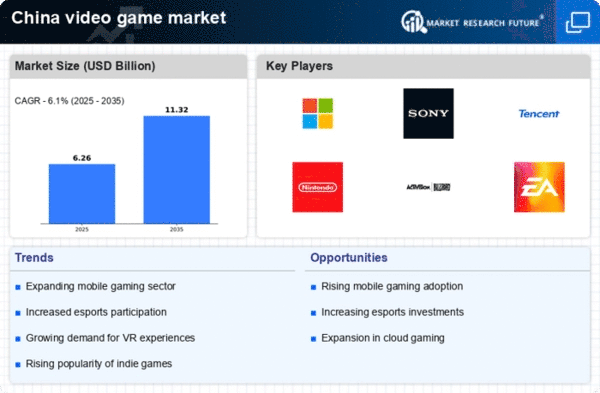Growing Youth Demographic
The youth demographic in China plays a pivotal role in the expansion of the video game market. With over 400 million gamers aged between 18 and 35, this age group represents a significant portion of the gaming population. Their preferences for mobile and online gaming are driving market growth, as they seek engaging and interactive experiences. The increasing accessibility of smartphones and affordable internet services has further fueled this trend. As a result, the video game market is projected to grow at a CAGR of around 10% over the next few years. This demographic's inclination towards social gaming and esports is also influencing game development, leading to a rise in multiplayer and competitive gaming formats. Consequently, understanding this demographic's preferences is essential for developers aiming to succeed in the video game market.
Cultural Acceptance of Gaming
Cultural acceptance of gaming in China is evolving, contributing positively to the video game market. Historically viewed with skepticism, gaming is increasingly recognized as a legitimate form of entertainment and social interaction. This shift is evident in the growing acceptance of esports as a mainstream activity, with major tournaments attracting millions of viewers. The government's support for the gaming industry, including initiatives to promote esports, further legitimizes gaming as a cultural phenomenon. As a result, the video game market is expected to benefit from this cultural shift, with more individuals participating in gaming activities. This acceptance is likely to lead to increased investment in game development and marketing, ultimately expanding the market's reach and influence.
Investment in Game Development
Investment in game development is a crucial driver for the video game market in China. With major companies like Tencent and NetEase investing heavily in new titles and innovative technologies, the market is poised for substantial growth. In 2025, the total investment in game development is projected to exceed $10 billion, reflecting the industry's commitment to creating high-quality content. This influx of capital not only supports the development of new games but also encourages the establishment of independent studios, fostering creativity and diversity in game offerings. Furthermore, partnerships with international developers are becoming more common, allowing for the exchange of ideas and resources. As investment continues to flow into the video game market, it is likely to enhance the overall quality and variety of games available to consumers.
Expansion of Online Gaming Platforms
The proliferation of online gaming platforms is significantly impacting the video game market in China. Platforms such as Tencent's WeGame and NetEase are becoming increasingly popular, providing gamers with access to a wide array of titles and genres. This shift towards online gaming is reflected in the market's revenue, which is expected to surpass $30 billion by 2025. The convenience of online gaming, coupled with the rise of cloud gaming services, allows players to enjoy games without the need for high-end hardware. Additionally, the social aspect of online gaming fosters community engagement, which is crucial for player retention. As more players turn to these platforms, the video game market is likely to see a diversification of game offerings, catering to various tastes and preferences.
Technological Advancements in Gaming
The video game market in China is experiencing a surge due to rapid technological advancements. Innovations in graphics, processing power, and virtual reality are enhancing user experiences. The introduction of 5G technology is particularly noteworthy, as it allows for faster download speeds and reduced latency, which are crucial for online gaming. This technological evolution is expected to attract more players, with the market projected to reach approximately $45 billion by 2025. Furthermore, the integration of artificial intelligence in game development is creating more immersive and personalized gaming experiences, which could lead to increased player retention and engagement. As these technologies continue to evolve, they are likely to reshape the landscape of the video game market, making it more competitive and dynamic.
















